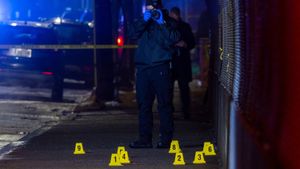Concerns are mounting about the Omagh bomb inquiry as former Irish government minister Charlie Flanagan expresses fears over the lack of comprehensive investigation procedures. The inquiry, centered around the bombing perpetrated by the Real IRA on August 15, 1998, which tragically resulted in the deaths of 29 individuals, including a pregnant woman, has ignited discussions on jurisdiction and evidence sharing between the UK and Ireland.
Flanagan has articulated the pressing need for Ireland to have established its parallel inquiry alongside the UK investigations, stating this would allow both jurisdictions to proceed at similar paces. His comments come as the public inquiry commenced substantive hearings last week, following pressure from families of victims and recommendations from legal judgments urging cooperative investigations.
During interviews, Flanagan conveyed his concerns saying, "An opportunity has been lost by not having a parallel process." He underscored the sentiment within certain jurisdictions—fear of gaps left by differing rules on evidence sharing, particularly with regards to current or former members of the Garda Síochána, the Irish police service. He highlighted the cross-jurisdictional elements of the investigation, referencing how attackers crossed the border before the blast, making joint investigation efforts imperative.
Joining Flanagan's call is Mary Lou McDonald, president of Sinn Féin. She has also urged the need for action from the Irish government to establish its inquiry, reinforcing Flanagan's assertions about the compellability of witnesses. McDonald remarked, "There is clearly a challenge and issue...we need to do everything necessary to make sure this inquiry is successful," emphasizing the urgency for concrete actions to close the information gaps identified.
Taoiseach Micheal Martin and Tánaiste Simon Harris have reassured the public of their government's commitment to cooperating with the UK inquiry, reiterations made amid growing concerns voiced by affected families. Martin has stated, "We have to cooperate fully with the (UK) inquiry team"—pointing toward legislation passed during previous inquiries allowing for the sharing of information. This stand has garnered skepticism from families, who feel left vulnerable due to potential gaps.
Harris, during his visit to Belfast, echoed the sentiment of cooperation, saying, "I want to be categoric here, the Irish Government will...ensure full cooperation with the inquiry." Yet, this talk of cooperation clashes with the skeptics who fear the current inability to compel evidence from Irish authorities may hinder the progress of the inquiry.
The Omagh bomb inquiry stands at a fissure of political and emotional tension. The bereaved families of those lost during one of Northern Ireland's most devastating attacks reiterate the need for openness and accountability as they wait for the truth to be unveiled. Their voices continue to resonate, urging the government to bridge the inquiries between the nations and provide clarity on the events leading up to the tragedy. The inquiry, which holds significant ramifications for community healing and justice, highlights the interplay between political commitment and personal loss as it progresses through its hearings.
With Flanagan's poignant reminders of the necessity for inclusive investigation methods, the questions surrounding national security are brought to the forefront—revisiting fears of using this as justification to limit the scope of cooperative information transfer. The families remain vigilant, hoping for transparency and justice amid the grappling emotions whose echoes persist decades after the horrific event.



